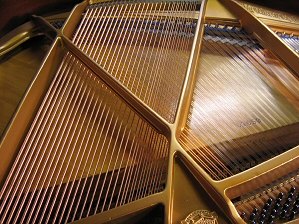Reasons for broken piano wire
Reasons for broken piano wire
Reasons for broken piano wire
There are several possible reasons for a piano wire to break
. Here are some common factors that can contribute to broken piano wire
. Fatigue: Piano wires undergo a significant amount of stress and tension when played repeatedly
. Over time, this stress can cause metal fatigue, leading to the wire eventually breaking
This is particularly true for older wires that have been subjected to extensive use
. Corrosion: If the piano is located in a humid environment or exposed to moisture, the wires can corrode over time
Corrosion weakens the integrity of the wire, making it more susceptible to breaking
. Improper installation or maintenance: If the piano wires are not properly installed or maintained, it can increase the likelihood of breakage
This includes issues such as incorrect tensioning, inadequate lubrication, or improper alignment of the wires
. Excessive force or impact: Playing the piano with excessive force or striking the keys too hard can put undue stress on the wires, causing them to break
Similarly, accidental impacts or mishandling of the piano can also lead to wire breakage
. Manufacturing defects: Although rare, manufacturing defects can contribute to wire breakage
Flaws in the wire’s composition or construction can weaken it, making it more prone to breakage
. Environmental factors: Extreme fluctuations in temperature and humidity can affect the tension and structural integrity of the wires
. Significant changes in these environmental conditions can lead to wire breakage.
It’s important to note that piano wires are designed to withstand a considerable amount of tension and usage
However, they are not indestructible, and regular maintenance, proper installation, and careful playing can help minimize the risk of wire breakage
. If a piano wire does break, it is typically recommended to have it replaced by a professional piano technician
You can call me if you had problems

